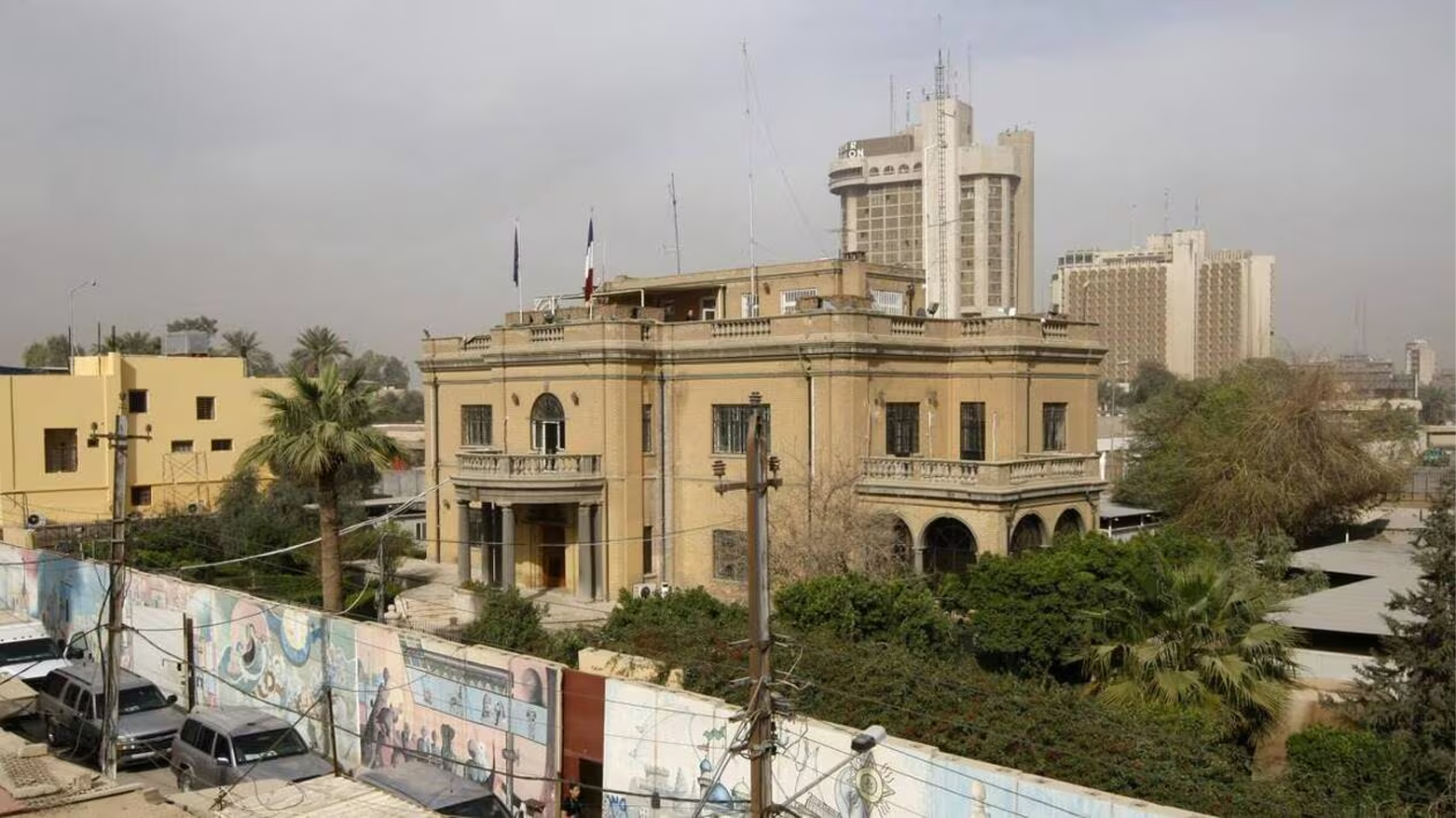A Family’s Claim on French Embassy Grounds in Iraq Reaches the Élysée
Descendants of the French Embassy's owners in Baghdad ask Macron for compensation, claiming "unlawful occupation" of their property, reports Le Figaro.

ERBIL (Kurdistan24) – The descendants of the owners of the building housing the French Embassy in Iraq have formally appealed to French President Emmanuel Macron to intervene in a decades-long dispute over property rights. According to a detailed report published by Le Figaro on Saturday, the legal successors of the property are reigniting a standoff with the French State that has persisted for half a century, accusing the French government of the "dispossession" and "unlawful occupation" of their family’s estate.
The dispute, which has now reached the corridors of the Élysée Palace, centers on a demand for compensation totaling nearly 21.5 million euros, covering approximately 50 years of unpaid rent and moral damages resulting from the complex geopolitical history of the region.
Le Figaro reports that the legal successors addressed an open letter to President Macron on Friday, urging him to personally intercede in a case that they argue has marred the ethical standing of the French Republic.
Philip Khazzam, one of the descendants of the original owners and a signatory of the letter, expressed the family's frustration and sense of betrayal in the correspondence.
"Mr. President of the Republic, we should never have reached this point," Khazzam wrote, underscoring the exhaustion of the family after years of unsuccessful efforts to reclaim their rights or receive just compensation for the use of their property in the Iraqi capital. The letter frames the issue not merely as a real estate dispute, but as a moral imperative that requires executive action to rectify a historical wrong.
The background of this property dispute is deeply rooted in the turbulent history of Iraq’s Jewish community in the mid-20th century.
As detailed by Le Figaro, the building’s historic owners were Iraqi Jews who were forced into exile in Canada during the late 1940s, a period marked by rising persecution and the mass exodus of Jews from Iraq. Despite their forced departure, the residence remained part of their legal assets.
The report highlights a crucial piece of legal history that supports the family's claim: in 1964, the French Ambassador to Iraq officially acknowledged their ownership by signing a lease agreement directly with the exiled family.
This document serves as a pivotal evidence point, demonstrating that the French State originally recognized the private ownership of the embassy grounds before policy shifts occurred in subsequent years.
The controversy arose when the French government ceased paying rent to the owners and instead began directing payments to the Iraqi authorities. In his letter to President Macron, Khazzam challenges the legitimacy of this shift.
"The French Embassy building in Baghdad belongs to my family," he asserts, noting that despite their "repeated requests for over 50 years, France refuses to compensate my family for the unlawful occupation of our property."
The correspondence poses a direct and poignant question to the French head of state: "Why does your government claim that Iraq—and not France—holds exclusive authority over the embassy building?"
Khazzam argues that the French government is complicit in the seizure of their assets, insisting that "France cannot occupy plundered property." He appeals to Macron’s sense of justice, writing, "I am certain that deep down, you agree," and asks for an intercession that would see the French government compensate the family "without further delay."
The French government's defense, as cited by Le Figaro based on a statement from the Ministry of Foreign Affairs seen by AFP, relies on the complex legal landscape of Iraq under the Ba'athist regime.
The Ministry argues that the French administration eventually concluded lease agreements with the Iraqi authorities because the historic owners had been effectively deprived of their real estate assets by Iraqi legislation targeting Jews who had left the country. This legal defense suggests that France was adhering to the local laws in force at the time, which had nationalized or seized the property of emigrants, thereby transferring the title—in the eyes of the Iraqi state—to the government in Baghdad.
However, the legal team representing the descendants vehemently rejects this reasoning, viewing it as a validation of discriminatory expropriation. Jean-Pierre Mignard, the lawyer representing the plaintiffs, provided a stark assessment of the situation to AFP in late October.
"Unfortunately, the French Republic is squatting in a building that is not its own," Mignard stated, characterizing the French diplomatic presence as an illegal tenancy.
To press their case, the legal team has escalated the matter within the French judicial system. Le Figaro reports that Mignard filed a substantive claim with the Paris Administrative Court in May 2024. Following this, an application for an interim payment—a legal maneuver designed to secure an accelerated procedure for compensation—was filed in February 2025.
As the legal proceedings grind forward, the family remains in a state of uncertainty. According to their lawyer, Mr. Mignard, no date has yet been set for the hearings regarding the substantive claim or the interim payment.
The open letter to Emmanuel Macron represents a strategic attempt to bypass the slow pace of the courts and achieve a political resolution to a grievance that spans generations. By framing the occupation of the embassy as a continuation of the "plundered property" narrative, the descendants are challenging France to align its diplomatic operations in Baghdad with its stated values of justice and property rights, awaiting a response from the Élysée that could finally bring closure to a dispute that has outlasted multiple governments in both Paris and Baghdad.